General
-
North African Cinema in a Global Context by This book provides insight into contemporary film production from North African countries referred to as the Maghreb. Focus is both on the socio-economic context of film production, which suffers some of the same setbacks and obstacles as other regions of the developing world, and on the thematic details treated in the films themselves. The book delves into ideas such as gender and sexuality, national identity, political conflict, and issues of post and neo-colonial relationships in the context of globalisation. The book includes close analyses of individual films which at times show the taboo subjects of sexual and substance abuse, the lives of street children, and prostitution, as well as upper-class contradictions between an increasingly global position of privilege while in the midst of a traditionalist society. Others chapters focus on an individual filmmakers¿ world view as depicted in representations of contemporary daily life of the average Tunisian, Moroccan or Algerian. The book provides an understanding of day to day existence in Morocco, Tunisia, and Algeria as depicted by local artists. The theoretical questions raised stretch beyond this topic to touch on ¿third world¿ art and film production, and production in conditions of political repression and rigid moral conservatism.
ISBN: 9781138864641Publication Date: 2015-03-31 -
Francophone African Cinema: history, culture, politics and theory by Setting the stage for a critical encounter between Francophone African cinema and Continental European critical theory, this book offers a transnational and interdisciplinary analysis of 16 Francophone African films, including Bassek Ba Kobhio's The Great White Man of Lambaréné, Cheick Oumar Sissoko's Guimba the Tyrant, and Amadou Seck's Saaraba. The author invites readers to study these films in the context of transnational conversations between African filmmakers and the conventional theorists whose works are more readily available in academia. The book examines black French filmmakers' treatments of a number of cross-cultural themes, including intercontinental encounters and reciprocity, ideology and subjective freedom, governance and moral responsibility, sexuality and social order, and globalization. Throughout the work, the presentation of literary theory is accessible by both beginning and advanced students of film and culture. Instructors considering this book for use in a course may request an examination copy here.
Call Number: Olin Library PN1993.5.A35 F75 2009ISBN: 9780786439621Publication Date: 2009-03-13 -
Africa's Lost Classics : New Histories of African Cinema by Until recently, the story of African film was marked by a series of truncated histories: many outstanding films from earlier decades were virtually inaccessible and thus often excluded from critical accounts. However, various conservation projects since the turn of the century have now begun to make many of these films available to critics and audiences in a way that was unimaginable just a decade ago. In this accessible and lively collection of essays, Lizelle Bisschoff and David Murphy draw together the best scholarship on the diverse and fragmented strands of African film history. Their volume recovers over 30 'lost' African classic films from 1920-2010 in order to provide a more complex genealogy and begin to trace new histories of African filmmaking: from 1920s Egyptian melodramas through lost gems from apartheid South Africa to neglected works by great Francophone directors, the full diversity of African cinema will be revealed.
Call Number: Olin PN1993.5.A35 A47 2014ISBN: 9781351577397Publication Date: 2017-07-05
Introductory reading(s)
 DE LA NAISSANCE DU CINÉMA KABYLE au cinéma amazigh
DE LA NAISSANCE DU CINÉMA KABYLE au cinéma amazigh
Frédérique Devaux Yahi - Images Plurielles - Paris : L'Harmattan, [2016]
BEAUX ARTS CINÉMA, PHOTOGRAPHIE MAGHREB, MOYEN ORIENT
Cette étude prend appui sur les trois premiers films kabyles, La Colline oubliée, d'Abderrahmane Bougermouh (1996), Machaho, de Belkacem Hadjadj (1996), La Montagne de Baya, d'Azzedine Meddour (1997), et se poursuit avec le premier film chaoui, La Maison jaune d'Amor Hakkar (2008), avant de faire un détour vers le cinéma berbère marocain, aux côtés de Mohamed Mernic. L'auteure s'intéresse tout naturellement au contexte politique et social ayant accompagné la naissance des oeuvres et aux requêtes des Imazighen les ayant précédées.
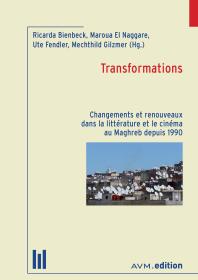 Transformations : Changements et renouveaux dans la littérature et le cinéma au Maghreb depuis 1990
Transformations : Changements et renouveaux dans la littérature et le cinéma au Maghreb depuis 1990
Bienbeck, Ricarda; Naggare, Maroua El; Fendler, Ute; Gilzmer, Mechthild
Akademische Verlagsgemeinschaft München 09/03/2016 - 264.
Les trois pays du Maghreb que sont le Maroc, l'Algérie et la Tunisie ont connu des modifications sociales et politiques importantes au cours des vingt dernières années. Ces changements ont trouvé dans la littérature et le cinéma un écho thématique et esthétique contribuant au débat interne à la société aussi bien qu'à l'émergence de nouvelles écritures poétiques et de nouvelles esthétiques filmiques. Les contributions à cet ouvrage abordent des conflits jusqu'alors tabou, des souvenirs et mémoires refoulés, des rêves et des utopies négociés de manière que cet espace entre écriture/lecture devient un espace qui peut lier le présent avec le passé et un futur imaginé.
-
Maghrebs in Motion by Exploring films made in Tunisia, Morocco, and Algeria from 1985 to 2009, Suzanne Gauch illustrates how late post-independence and early twenty-first century North African cinema prefigured many of the transformations in perception and relation that stunned both participants and onlookersduring the remarkable uprisings of the 2011 Arab Spring. Through multifaceted examinations of key films by nine filmmakers - Farida Benlyazid, Mohamed Chouikh, Nacer Khemir, Nabil Ayouch, Lyes Salem, Nadia El Fani, Tariq Teguia, Faouzi Bensaidi, and Nejib Belkadhi - Gauch delineates the shiftingrelation of politics to film in the era of neoliberal globalization. Each work, she argues, taps the power inherent in cinema to destabilize patterns of perception and judgment while taking film's role as popular entertainment in new directions. Highlighting how each film taps into the mobility at the core of cinema to break through the boundaries that have long circumscribed filmmaking from North Africa, Gauch shows how this cinema continues to forge and reflect unexpected trajectories for itself and its audiences.
ISBN: 9780190262570Publication Date: 2016-01-06
-
Masculinités maghrébines : nouvelles perspectives sur la culture, la littérature et le cinéma by
ISBN: 9789004342828Publication Date: Brill/Rodopi, 2018.This volume seeks to revisit the Franco-Maghrebian representations of masculinity in the line of the New Men's Studies examining the aesthetical expressions as well as their interconnectedness with the sociocultural realities. In order to emphasize the arts' role to rethink the codes of masculinity related to social, national and cultural identities, it assembles the work of experts from different research fields as Maghrebian Studies, Gender and Queer Studies, Popular culture, Cinema and Media Studies, sociology and anthropology. Their contributions unveil the processes of formation, negotiation and transformation of gendered and sexual norms in the societies at issue here providing an in-depth description of the variety of Maghrebian masculinities
Other selected book titles
L’Autre dans le cinéma  / Ouvrage collectif sous la direction de Khouloud Ben Mohamed Gherbi
/ Ouvrage collectif sous la direction de Khouloud Ben Mohamed Gherbi
Langue: arabe, français
Les experts en psychiatrie et en psychanalyse s’intéressent dans leurs lectures des œuvres cinématographiques aux motifs psychiques et émotionnels en tant qu’éléments fondamentaux pour la compréhension de la structure du texte cinématographique. Le sociologue, quant à lui, il saisit le sens du message cinématographique comme étant un indice exprimant succinctement ce qui se passe dans une société complexe Ainsi, le film constitué de symboles suscite chez le récepteur certaines interprétations reflétant son expérience culturelle. La compréhension de la marche sémantique du film se rattache également à l’état psycho-mental étant donné que le récepteur est « pluriel » eu égard à ses dimensions mentale, psychique et culturelle. Ce sont là les principaux thèmes de cet ouvrage ayant pour titre: L’َAutre dans le cinéma. Le lecteur y trouve différentes approches de médecins, sociologues, écrivains tunisiens, européens et arabes reflétant différentes démarches culturelles de nature à nous faire rapprocher de l’Autre, nanti, lui aussi, d’expériences variées et multiples.
-
-
Postcolonial images : studies in North African film byCall Number: Baker/Berry PN 1993.5 .A35 A76 2005ISBN: 0253344441Postcolonial Images is a comprehensive introduction to and resource for cinema of the Maghreb. In clear and accessible prose, Roy Armes examines the political and cultural context of the films and the film industry in the post-independence era.
-
From North Africa to France : family migration in text and film by
ISBN: 9780854572403Publication Date: [London] : Institute of Modern Languages Research, 2015. -
ISBN: 9783954770458
Tunisia
7e art = Septiéme art = Septiem art : "Revue de culture par le film." [1960s--] Tunis, Tunisia Quarterly Text in French and Arabic.
Écrans de Tunisie. Tunis : Écrans de Tunisie, 1986- "Revue hebdomadaire (paraissant tous les mois, provisoirement)" No 1, (mars 1986)-

 Cinéma tunisien - la référence cinéma
Cinéma tunisien - la référence cinéma
"La gestion du site web est assurée en France par l’Association «Cinematunisien.com» et en Tunisie par l’«Association Tunisienne de Développement du Cinéma» (ATDC). Le site fonctionne 24 heures sur 24 et 7 jours sur 7.Il est libre d'accès, à l’exception des rubriques de services.

LA LAINE SUR LE DOS - Festival de Cannes May 21, 2016 - While driving along a road in the Tunisian desert in an old battered van on their way to market to sell their sheep, an old man and his grand-son are stopped by two policemen. In order to be allowed to leave, they have to accept a strange and unusual deal. [www.festival-cannes.com/en/films/la-laine-sur-le-dos]

- TUNISIAN FEDERATION OF AMATEUR CINEASTES
- Cinéma – Férid Boughedir : « Je tends un miroir aux Tunisiens »
- Pas d’idées de films ? Découvrez Watamoovie, le site de recommandations lancé par un jeune Tunisien Quels films regarder aujourd’hui ? Watamoovie, un site collaboratif de recommandations, vous répond en quelques clics, grâce au travail de Waad Toumi, amoureux du web et passionné de cinéma.
- Lablâbi connexion = الدنيا هبال : scénario policier / Khémais Khayati ; préface de Ibrahim Ltaïef.
-
Coproducing Nostalgia across the Mediterranean: Visions of the Jewish-Muslim Past in French-Tunisian Cinema. Politics. Rivista di Studi Politici. (5), 1/2016, 105-123.
-
Cinéma tunisien - la référence cinéma [cinéma tunisien - la référence cinéma en tunisie]
- CNCI (Centre National du Cinéma et de l'Image) – Tunisi
- Hommage aux actrices pionnières du cinéma tunisien
- JCC 50+ mémoire fertile / sous la direction de Khemais Khayati = من ذاكرة ايام قرطاج السينمائية / إعداد وإشراف خميس الخياطي
- Reworlding Tunisia: sacrifice in post-revolutionary cinema / Liverpool University Press, 2018. Abstract : Sacrifice permeates narratives of revolution and of national identity. In the context of the 2011 Tunisian revolution, the visual trope of sacrificeas-legitimacy has accrued particularly strong domestic and transnational force. This essay explores how the visual trope of sacrifice emanates from, and circulates through, recent documentaries and fiction films including Serge Moati's Artistes en Tunisie (2013), Nadia El Fani's Même pas mal (2012), Amine Chiboub's Résistance (2013), and Moncef Barbouch's Conflit (2014). These works highlight the visual circulation, recycling, and redefinition of sacrifice as integral to the history of the popular uprising. As a figure of dissent, sacrifice works by exceeding and pushing back against mainstream ideologies, articulating revolutionary calls for democratization. Yet it can also bolster monolithic formulations of national and religious belonging. In tracing a range of recent filmic depictions of sacrifice, I ask what is captured in, and what escapes from, this powerful figure. Finally, how might sacrifice work to "reworld" - reinvent, redefine, and reposition the Tunisian cultural identities mediated in film? Given Maghrebi cinema's progressive "de-orbiting" (Martin) from its traditional economic centers, toward a more dynamic, transnational culture of cinéma-monde, what are the stakes for Tunisia's new, multiple, and competing figurations of revolutionary sacrifice?
-
Masculinities, generations, and cultural transformation in contemporary Tunisian cinema / Martin Stollery. Screen, Volume 42, Issue 1, Spring 2001, Pages 49–63, https://doi.org/10.1093/screen/42.1.49 Published: 01 March 2001

 Cinéma tunisien - la référence cinéma
Cinéma tunisien - la référence cinéma
"La gestion du site web est assurée en France par l’Association «Cinematunisien.com» et en Tunisie par l’«Association Tunisienne de Développement du Cinéma» (ATDC). Le site fonctionne 24 heures sur 24 et 7 jours sur 7.Il est libre d'accès, à l’exception des rubriques de services.

Fédération tunisienne des cinéastes amateurs (FTCA), Créée en 1962, la FTCA: une histoire et un berceau de générations de cinéastes tunisiens
CNCI (Centre National du Cinéma et de l'Image) – Tunisie - La Cinémathèque Tunisienne, rattachée au Centre national du cinéma et de l'image (CNCI)
Ten Nights in Tunisia: Les Journées Cinématographiques de Carthage / Ruoff Jeffrey 2008, Film International, v. 6, n. 4, pp. 43-51.
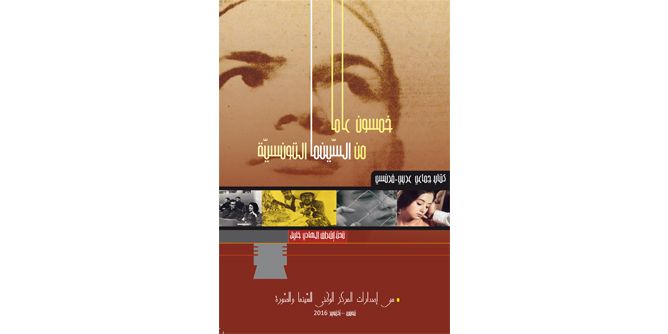 خمسون عاما من السينما التونسية
خمسون عاما من السينما التونسية
[50 years of Tunisian cinema]

Festival International du Film Amateur de Kélibia (FIFAK - TUNISIE)
 LGBT film gets warm welcome at Tunisia festival
LGBT film gets warm welcome at Tunisia festival
Nov 10, 2017 - The room of 500 seats was not big enough to fit all those who flocked to see "
Flash - LGBT film gets warm welcome at Tunisia festival

A Queer Film Festival in Tunisia — Where Being Gay Is Illegal
The New York Times, May 14, 2019
-
 Le Cinéma Tunisien à la Lumière de la Modernité Etudes critiques de films Tunisiens (1996-2006)
by
Call Number: olin PN1993.5.T75 C43 2009ISBN: 9789973375384Publication Date: 2009.
Le Cinéma Tunisien à la Lumière de la Modernité Etudes critiques de films Tunisiens (1996-2006)
by
Call Number: olin PN1993.5.T75 C43 2009ISBN: 9789973375384Publication Date: 2009. -
-
 Le parcours et la trace : ‡b témoignages et documents sur le cinéma tunisien
by
Call Number: olin PN1993.5.T75 K46 2002ISBN: 9789973807281Publication Date: 2002
Le parcours et la trace : ‡b témoignages et documents sur le cinéma tunisien
by
Call Number: olin PN1993.5.T75 K46 2002ISBN: 9789973807281Publication Date: 2002 -
New Tunisian Cinema by Tunisian cinema is often described as the most daring of all Arab cinemas. For many, Tunisia appeared to be a model of equipoise between "East" and "West," and yet, during Zine El Abidine Ben Ali's presidency, from 1987 to 2011, the country became the most repressive state in the Maghreb. Against considerable odds, a generation of filmmakers emerged in the mid-1980s to make films that are allegories of resistance to the increasingly illiberal trends that were marking their society. In New Tunisian Cinema, Robert Lang focuses on eight films by some of the nation's best-known directors, including Man of Ashes (1986), Bezness (1992) and Making Of (2006) by Nouri Bouzid, Halfaouine (1990) by Férid Boughedir, The Silences of the Palace (1994) by Moufida Tlatli, Essaïda (1997) by Mohamed Zran, Bedwin Hacker (2002) by Nadia El Fani, and The TV Is Coming (2006) by Moncef Dhouib. He explores the political economy and social, historical, and psychoanalytic dimensions of these works and the strategies filmmakers deployed to preserve cinema's ability to shape debates about national identity. These debates, Lang argues, not only helped initiate the 2011 uprising that ousted Ben Ali's regime but also did much to inform and articulate the aspirations of the Tunisian people in the new millennium.
Call Number: olin PN1993.5.T75 L36 2014ISBN: 9780231165068Publication Date: 2014-04-01 -
 En désespoir d'image : chroniques de cinéma et de télévision
by
Call Number: Olin PN1993.5.T75 K43 2000ISBN: 9789973280824Publication Date: Tunis Editions Sahar, 2000
En désespoir d'image : chroniques de cinéma et de télévision
by
Call Number: Olin PN1993.5.T75 K43 2000ISBN: 9789973280824Publication Date: Tunis Editions Sahar, 2000 -
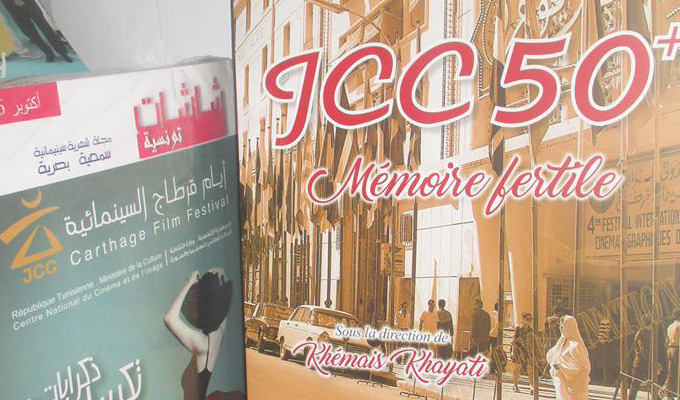 من ذاكرة أيام قرطاج السينمائية--JCC 50+ mémoire fertile
by
Call Number: Olin PN1993.42.T8 K439 2016ISBN: 9789938071900Publication Date: Tunis : Éditions Arabesques, 2016.
من ذاكرة أيام قرطاج السينمائية--JCC 50+ mémoire fertile
by
Call Number: Olin PN1993.42.T8 K439 2016ISBN: 9789938071900Publication Date: Tunis : Éditions Arabesques, 2016. -
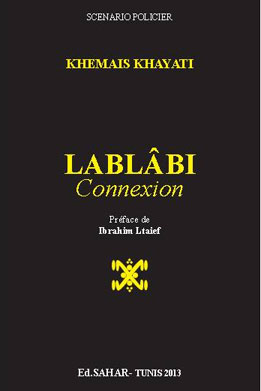 Lablâbi connexion = al-Dunyā hibāl : scénario policier
by
Call Number: olin PN1997.3 .K43 2013ISBN: 9789973283993Publication Date: Tunis : Editions Sahar, 2013.
Lablâbi connexion = al-Dunyā hibāl : scénario policier
by
Call Number: olin PN1997.3 .K43 2013ISBN: 9789973283993Publication Date: Tunis : Editions Sahar, 2013.
Algeria
-
 Dictionnaire du cinéma Algérien et des films étrangers sur l'Algérie :réalisateurs, comédiens, films
by
Call Number: Olin PN1993.5.A4 C46 2013ISBN: 9961649702Publication Date: Alger : Casbah editions, 2013.
Dictionnaire du cinéma Algérien et des films étrangers sur l'Algérie :réalisateurs, comédiens, films
by
Call Number: Olin PN1993.5.A4 C46 2013ISBN: 9961649702Publication Date: Alger : Casbah editions, 2013.
Les revues françaises de cinéma face à la guerre d’Algérie / Association française de recherche sur l'histoire du cinéma (AFRHC). The Response of French Film Journals to the Algerian War. During the Algerian War (1954-1962), French film journals and Algerian corporate magazines published different and even contradictory accounts of the conflict. As a new wave of film criticism developed and different camps emerged, left-wing critics commented on the conflict and its representations, in an often allegorical manner. Conservative reviewers refused the ideological debate and restricted their discourse to aesthetic issues. Moreover, the war itself was not discussed in most film publications until the end of the conflict, along with the larger intellectual debate about this colonial war, whose end had been decided by General De Gaulle since September 1959. The Algerian trade papers related the growing fears of French settlers (‘Pieds-noirs’) as French institutions were progressively withdrawing from the country. They also discussed the consequences of the war on the economics of the local film industry. [1895. Revue de l'association française de recherche sur l'histoire du cinéma].
2 écrans = Les 2 écrans = Deux écrans. "Revue mensuelle de cinéma et de télévision." [no 1-55/56; mars 1978-avril-mai 1983.] Alger, Les 2 écrans. French and Arabic.
أسرو Asaru cinéma. Asarū. "Revue du commissariat du Festival culturel national annuel du film amazigh." In French; some Arabic. El-Hamma, Alger : Bibliothèque national d'Algérie, Espave festival du film Amazigh. Quarterly. Began with: No 01 (janvier 2007).
Mediasud : magazine mensuel de television, cinema et video. Monthly (irregular). Alger : SAPRECOM [1990--]

- Les Chefs-d'œuvre du cinéma Algérien
- CINÉMA ALGÉRIEN
- La cinémathèque à Alger-Centre
- Cinéma : La Cinémathèque algérienne fête ses 50 ans
- Liste de films algériens
- Films algériens [archive] sur l'Internet Movie Database
- Filmographie sur la Guerre d'Algérie - Académie de Strasbourg
- المسالك::متحف السينما الجزائرية
- La Cinémathèque d'Alger
- Cinémathèque algérienne | PIAF - Portail International Archivistique
-
Le cinéma algérien rêve d'indépendance financière - Le Monde
-
Archives Numériques du Cinéma Algérien - YouTube
 Oran International Arabic Film Festival
Oran International Arabic Film Festival


-
 Dictionnaire du cinéma Algérien et des films étrangers sur l'Algérie :réalisateurs, comédiens, films
by
Call Number: Olin PN1993.5.A4 C46 2013ISBN: 9789961649701Publication Date: Alger : Casbah editions, 2013.
Dictionnaire du cinéma Algérien et des films étrangers sur l'Algérie :réalisateurs, comédiens, films
by
Call Number: Olin PN1993.5.A4 C46 2013ISBN: 9789961649701Publication Date: Alger : Casbah editions, 2013. -
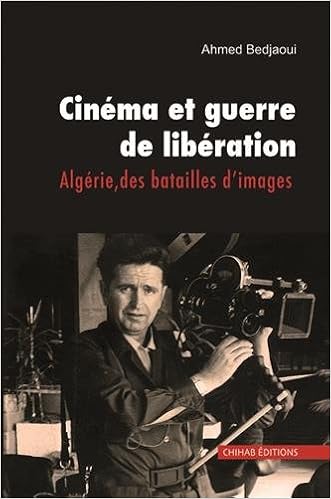 Cinéma et guerre de libération : Algérie, des batailles d’images
by
Call Number: Olin DT295 .B3785 2014ISBN: 9789947390733Publication Date: [Alger] : Éditions Chihab, [2014]
Cinéma et guerre de libération : Algérie, des batailles d’images
by
Call Number: Olin DT295 .B3785 2014ISBN: 9789947390733Publication Date: [Alger] : Éditions Chihab, [2014] -
Algerian National Cinema by
ISBN: 9781526106872Publication Date: 2016-10-01This topical and innovative study is the first book on Algerian cinema to be published in English since the 1970s. At a time when North African and Islamic cultures are of increasing political significance, Algerian National Cinema presents a dynamic, detailed and up to date analysis of howfilm has represented this often misunderstood nation. Algerian National Cinema explores key films from The Battle of Algiers (1966) to Mascarades (2007). Introductions to Algerian history and to the national film industry are followed by chapters on the essential genres and themes of filmmaking in Algeria, including films of anti-colonial struggle,representations of gender, Berber cinema, and filming the "black decade" of the 1990s. This thoughtful and timely book will appeal to all interested in world cinemas, in North African and Islamic cultures, and in the role of cinema as a vehicle for the expression of contested identities. By theauthor of the critically-acclaimed Contemporary French Cinema.
Morocco
Seize/neuvième. 16/9ème. Nouveau magazine du film. Bimonthly. Began with no 1 (déc 07/jan 08). Rabat, Maroc : Code barre productions.
Ciné.ma = Ciné ma = Sīni.mā = Sīni mā. Began with no. 1 (été 2004). French and Arabic. Tanger : Association des critiques de cinema au Maroc, 2004-
Cine mag. Quarterly. Began with no. 1 (Septembre/Octobre/Novembre 2006). Casablanca : [s.n.], 2006-
Dirāsāt sīnimāʼīyah : majallat al-Jāmiʻah al-Waṭanīyah lil-Andiyah al-Sīnimāʼīyah. Dirassat cinimaiya. Four times a year. Arabic and French. Etudes cinématographiques. [al-Rabāṭ, Morocco] : al-Jāmiʻah [1986--]
المجلة المغربية للابحاث السينمائية. al-Majallah al-Maghribīyah lil-abḥāth al-sīnimāʼīyah Revue Marocaine des recherches cinématographiques Chiefly in Arabic, some in French. [Tangier, Morocco] : الجمعية المغربية لنقاد السينما, ǂc 2013-] Semiannual al-ʻAdad 1. (Dujanbir 2013)-
وشمة : ǂمجلة سينمائية تصدرها جمعية أصدقاء السينما بتطوان. Washmah : majallah sīnimāʼīyah tuṣdiruhā Jamʻīyat Aṣdiqāʼ al-Sīnimā bi-Taṭwān. Wachma. Arabic and French. Taṭwān [Morocco] : Jamʻīyat Aṣdiqāʼ al-Sīnimā bi-Taṭwān, [2005]- al-ʻAdad 1. (Māy/Yūnyū/Yūlyūz/Ghusht 2005)-
 CINÉMA MAROCAIN
CINÉMA MAROCAIN
Vous trouverez ici les fiches biographiques des réalisateurs et acteurs, ainsi que leur filmographie ; nous présentons aussi (en bas) la liste des films tournés au Maroc ou sur le Maroc.
- CINÉMA MAROCAIN
- السينما المغربية / ǂ إعداد محمد شويكة ؛ المساهمون في العدد عبد الرحمن طنكول [and 39 others]. "ينايير 2014 Janvier"-- آفاق : مجلة اتحاد كتاب المغرب
- السينما المغربية : ǂ تحرير الذاكرة.. تحرير العين / ǂ محمد أشويكة.
- أطروحات وتجارب حول السينما المغربية / ǂ محمد اشويكة.
- مدخل إلى السينما المغربية : ǂ من السينما الوطنية إلى السينما الأمازيغية / ǂ جميل حمداوي.
- هوية السينما المغربية : ǂ فتنة اللامرئي وقلق المغلوبين / ǂ د. حميد اتباتو.
- أبحاث في السينما المغربية / ǂ مصطفى المسناوي.
- وجوه من السينما المغربية / ǂ فؤاد زويريق.
الكتب السينمائية بالمغرب تقفز على الأساسيات
-
Beyond Casablanca by In Beyond Casablanca, Kevin Dwyer explores the problems of creativity in the Arab and African world, focusing on Moroccan cinema and one of its key figures, filmmaker M. A. Tazi. Dwyer develops three themes simultaneously: the filmmaker's career and films; filmmaking in postcolonial Morocco; and the relationship between Moroccan cinema, Third World and Arab cinema, and the global film industry. This compelling discussion of Moroccan cinema is founded upon decades of anthropological research in Morocco, most recently on the Moroccan film sector and the global film industry, and exhibits a sensitivity to the cultural, political, social, and economic context of creative activity. The book centers on a series of interviews conducted with Tazi, whose career provides a rich commentary on the world of Moroccan cinema and on Moroccan cinema in the world. The interviews are framed, variously, by presentations of Moroccan history, society, and culture; the role of foreign filmmakers in Morocco; thematic discussions of cinematic issues (such as narrative techniques, the use of symbols, film as an expression of identity, and problems of censorship); and the global context of Third World filmmaking.
ISBN: 9780253344625Publication Date: 2004-11-25 -
What Moroccan Cinema? by This book constitutes the refereed proceedings of the 6th International Conference on Conceptual Structures, ICCS'98, held in Montpellier, France, in August 1998. The 20 revised full papers and 10 research reports presented were carefully selected from a total of 66 submissions; also included are three invited contributions. The volume is divided in topical sections on knowledge representation and knowledge engineering, tools, conceptual graphs and other models, relationships with logics, algorithms and complexity, natural language processing, and applications.
ISBN: 9780739131855Publication Date: 2009-08-13 -
Screening Morocco by Since 1999 and the death of King Hassan II, Morocco has experienced a dramatic social transformation. Encouraged by the more openly democratic climate fostered by young King Mohammed VI, filmmakers have begun to explore the sociocultural and political debates of their country while also seeking to document the untold stories of a dark past. Screening Morocco: Contemporary Film in a Changing Society focuses on Moroccan films produced and distributed from 1999 to the present. Moroccan cinema serves as an all-inclusive medium that provides a sounding board for a society that is remaking itself. Male and female directors present the face of an engaged, multiethnic and multilingual society. Their cinematography promotes a country that is dynamic and connected to the global sociocultural economy of the twenty-first century. At the same time, they seek to represent the closed, obscure past of a nation's history that has rarely been told, drawing on themes such as human rights abuse, the former incarceration of thousands during the Lead Years, women's emancipation, poverty, and claims for social justice. Screening Morocco will introduce American readers to the richness in theme and scope of the cinematic production of Morocco.
ISBN: 9780896802810Publication Date: 2011-05-24 -
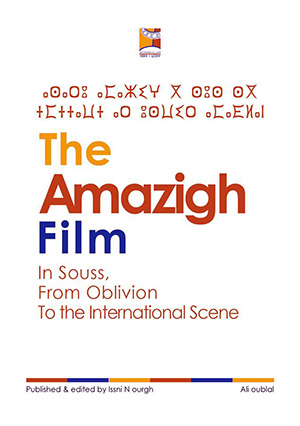 The Amazigh film : in Souss, from oblivion to the international scene
by
Call Number: olin PN1995.9.B46 O93 2014ISBN: 9789954343555Publication Date: [Morocco?] : Issni n Ourgh, [2014]
The Amazigh film : in Souss, from oblivion to the international scene
by
Call Number: olin PN1995.9.B46 O93 2014ISBN: 9789954343555Publication Date: [Morocco?] : Issni n Ourgh, [2014]
السينما المغربية في قفص الاتهام.. اغتراب عن الواقع
Copyright © القدس العربي Alquds Newspaper.
:الكتب السينمائية بالمغرب تقفز على الأساسيات
العديد من المؤلفات تتجه نحو أمور ثانوية مثل نظريات الأفلام وجماليتها وتتجاهل تاريخ السينما كمقدمة تمهيدية لا غنى عنها.

The Marrakech International Film Festival
Selected movie titles
For similar films, click here.
The Occupation of Tunisia and Algeria Through Film: A part of North Africa: Algeria and Tunisia’s occupations are not discussed often. Although their portrayal of occupation through film may be complicated, still, The Wedding Song (2008) and The Battle of Algiers (1966) have achieved the portrayal in an outstanding way.
**************************

Bab'Aziz : Le prince qui contemplait son ame = Bab'Aziz: The prince who contemplated his soul [The prince who contemplated his soul] by
Poupées d'argile = Clay dolls by ![]() Omrane, 40, a former domestic, feels liberated when he sets up a modest housekeeping business. He transports "maids of all work" in his delivery van from his native village -- renowned for the women's know-how in the arts of Berber pottery -- to the nouveau riche families recently settled in the posh part of town. He vouches for the women's safety and for their salaries to their parents. Rebeh, rebellious and beautiful, is his most exuberant employee. Although submerged by harsh housework, she gets caught on the breeze of freedom and the joys of life and takes off. She remains on Omrane's conscience and he sets out to look for her in the city. He's accompanied by Fedah, 9, one of his new girls who has yet to find a job.
Omrane, 40, a former domestic, feels liberated when he sets up a modest housekeeping business. He transports "maids of all work" in his delivery van from his native village -- renowned for the women's know-how in the arts of Berber pottery -- to the nouveau riche families recently settled in the posh part of town. He vouches for the women's safety and for their salaries to their parents. Rebeh, rebellious and beautiful, is his most exuberant employee. Although submerged by harsh housework, she gets caught on the breeze of freedom and the joys of life and takes off. She remains on Omrane's conscience and he sets out to look for her in the city. He's accompanied by Fedah, 9, one of his new girls who has yet to find a job.












